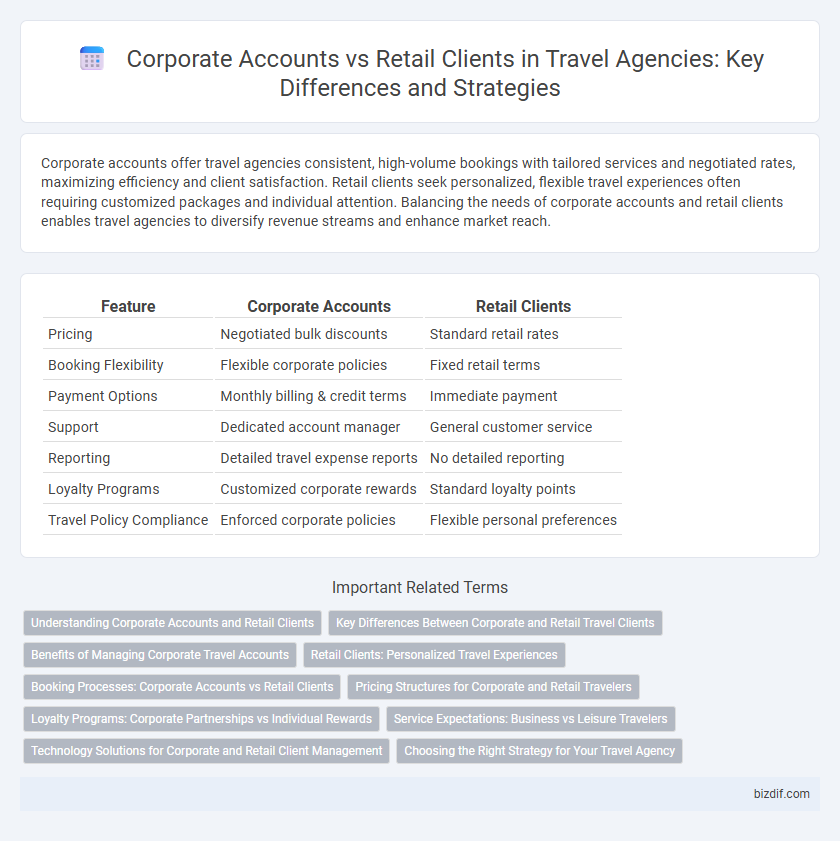Corporate accounts offer travel agencies consistent, high-volume bookings with tailored services and negotiated rates, maximizing efficiency and client satisfaction. Retail clients seek personalized, flexible travel experiences often requiring customized packages and individual attention. Balancing the needs of corporate accounts and retail clients enables travel agencies to diversify revenue streams and enhance market reach.
Table of Comparison
| Feature | Corporate Accounts | Retail Clients |
|---|---|---|
| Pricing | Negotiated bulk discounts | Standard retail rates |
| Booking Flexibility | Flexible corporate policies | Fixed retail terms |
| Payment Options | Monthly billing & credit terms | Immediate payment |
| Support | Dedicated account manager | General customer service |
| Reporting | Detailed travel expense reports | No detailed reporting |
| Loyalty Programs | Customized corporate rewards | Standard loyalty points |
| Travel Policy Compliance | Enforced corporate policies | Flexible personal preferences |
Understanding Corporate Accounts and Retail Clients
Corporate accounts typically involve businesses requiring bulk travel arrangements, streamlined billing, and customized services to meet organizational policies, resulting in negotiated rates and dedicated support. Retail clients are individual travelers or small groups seeking personalized experiences, flexible payment options, and a wide variety of travel packages tailored to leisure needs. Understanding the distinct preferences and requirements of both corporate accounts and retail clients enables travel agencies to optimize service delivery and maximize client satisfaction.
Key Differences Between Corporate and Retail Travel Clients
Corporate travel clients prioritize cost efficiency, streamlined booking processes, and flexible invoicing solutions tailored to business policies. Retail clients typically seek personalized experiences, leisure destinations, and competitive pricing for individual or family trips. Understanding these key differences helps travel agencies customize services and optimize client satisfaction across market segments.
Benefits of Managing Corporate Travel Accounts
Managing corporate travel accounts ensures streamlined booking processes, exclusive negotiated rates, and detailed travel expense reporting, enhancing budget control and compliance for businesses. Corporate accounts often receive priority customer service and access to tailored travel solutions that accommodate complex itineraries and last-minute changes. This targeted management reduces administrative overhead and improves overall travel efficiency compared to handling individual retail client bookings.
Retail Clients: Personalized Travel Experiences
Retail clients benefit from highly personalized travel experiences tailored to individual preferences, interests, and budgets. Travel agencies leverage detailed customer profiles and advanced data analytics to create custom itineraries, exclusive offers, and unique local experiences. This personalized approach enhances customer satisfaction, loyalty, and repeat bookings compared to the standardized services often provided to corporate accounts.
Booking Processes: Corporate Accounts vs Retail Clients
Corporate accounts benefit from streamlined booking processes with dedicated account managers, negotiated rates, and customized invoicing systems that enhance efficiency and control over travel expenses. Retail clients experience a more flexible but less formal booking approach, often relying on online platforms or travel agents for individual bookings and immediate travel options. The differentiation in booking procedures reflects the scale, customization needs, and administrative requirements unique to each client type within the travel industry.
Pricing Structures for Corporate and Retail Travelers
Corporate accounts benefit from negotiated pricing structures that offer volume discounts, flexible payment terms, and customized travel solutions tailored to business needs. Retail clients typically face standard rate pricing with limited flexibility but access to promotional offers and seasonal discounts. Travel agencies optimize revenue by balancing fixed corporate contracts and dynamic retail pricing strategies.
Loyalty Programs: Corporate Partnerships vs Individual Rewards
Corporate accounts benefit from tailored loyalty programs that emphasize long-term partnerships, offering volume-based discounts, priority support, and exclusive access to premium services designed to streamline business travel. Retail clients enjoy personalized rewards focused on individual preferences, such as points accumulation, cashback offers, and flexible redemption options for leisure trips. Both loyalty models aim to enhance customer retention, but corporate partnerships foster sustained business growth through negotiated benefits, while individual rewards drive repeat bookings via personalized incentives.
Service Expectations: Business vs Leisure Travelers
Corporate accounts demand streamlined booking processes, tailored travel policies, and priority support to accommodate tight schedules and frequent trips. Retail clients, primarily leisure travelers, expect flexible itineraries, personalized recommendations, and competitive pricing for vacations and leisure activities. Service expectations for business travelers emphasize efficiency and reliability, whereas leisure travelers prioritize experience and customization.
Technology Solutions for Corporate and Retail Client Management
Technology solutions for corporate accounts streamline complex travel policies, expense tracking, and customized reporting through integrated platforms like SAP Concur and Egencia, enhancing efficiency and compliance. Retail client management benefits from AI-driven personalization tools and CRM systems such as Salesforce Travel Cloud, enabling tailored offers and seamless booking experiences. Both segments leverage mobile apps and data analytics to improve customer engagement, optimize itineraries, and ensure real-time communication.
Choosing the Right Strategy for Your Travel Agency
Corporate accounts deliver higher revenue through bulk bookings and long-term contracts, ensuring consistent cash flow for travel agencies. Retail clients offer diverse travel preferences and frequent, smaller transactions that enhance brand visibility and responsiveness. Tailoring marketing efforts to suit corporate demands while maintaining personalized service for retail travelers optimizes growth and profitability.
Corporate accounts vs Retail clients Infographic

 bizdif.com
bizdif.com